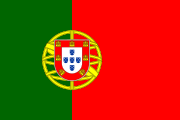They don't speak Spanish, even though Spain surrounds them on two sides.
The Portuguese Republic (República Portuguesa) is a democratic state, a member of the European Union since 1986 and a founding member of NATO.
A dictatorship ruled the country between 1933 and 1974, providing only vocal support for the Axis in World War Two and being finally brought down by the bloodless Carnation Revolution, which followed the Portuguese Colonial War of 1961-74. During World War II, its neutrality and strategic position made the capital of Lisbon a notable City of Spies, as Lisbon was the last port out of Europe for anyone seeking to escape trouble (i.e., refugees) and the first in for anyone looking for trouble (i.e., secret agents). During this time, it got a glamorous reputation both for its prosperity compared to the belligerents and for the celebrity fugitives crowding into it. It had something of the air of the movie Casablanca and indeed was mentioned there.
The former Portuguese Empire included, most famously, Brazil, but also Cape Verde, Angola, Mozambique, Guinea-Bissau, Goa, Daman, Diu, Timor and Macau.
In probably the best example of a real life Binding Ancient Treaty, Portugal and the UK have been allied since the Anglo-Portuguese Treaty of 1373 (or the Windsor Treaty of 1386, depends who you ask), the oldest alliance that's still in force.
Famous Portuguese
- Many famous discoverers / conquerors, like Henry the navigator, Afonso de Albuquerque, Pedro Álvares Cabral, Bartolomeu Dias, Vasco da Gama and Ferdinand Magellan (Portuguese: Fernão de Magalhães).
- Writers like Luís de Camões, Fernando Pessoa and the Nobel Prize winner José Saramago.
- Maria de Medeiros, aka Fabienne from Pulp Fiction
- Football players like Eusébio and Luís Figo (most recently Cristiano Ronaldo)
Portugal in fiction
- The maid of the author in Love Actually is Portuguese, and he also visits Portugal later in the movie.
- A good chunk of Sharpe takes place in Portugal.
- Dinosaur Revolution's second episode happens where now is the Lourinhã Formation.
- Victor Lazlo and his wife head there at the end of Casablanca.

The Portuguese flag
